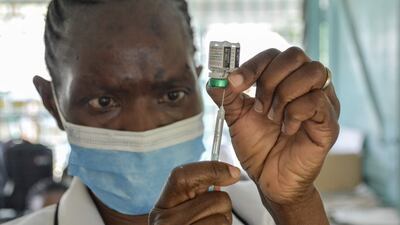The WHO’s approval of the first malaria vaccine has been welcomed around the world, but experts say the struggle against the disease is far from over due to multiple factors, including resistance.
The global health body said the RTS, S jab, or Mosquirix, which has a 30 per cent efficacy rate, could save tens of thousands of lives a year.
Professor Julian Rayner, a malaria researcher and the Director of the Cambridge Institute for Medical Research, part of the University of Cambridge School of Clinical Medicine, said it was a significant development but the fight is far from other.
He told The National the authorities will need to monitor its effect closely as the risk of the parasite developing resistance to it remains high.
“It’s been tested incredibly rigorously but just as bacteria can develop resistance to antibiotics, malaria parasites can develop resistance to malaria drugs,” he said.
“With 70 years of drugs, overtime the parasite has become resistant to them and we have needed to develop new drugs.
“We are having to run to keep ahead of the parasite. It is very adaptable.
“We don’t know whether [the parasite] will develop resistance to a vaccine or a drug. This is evolutionary and every time you bring out something new the parasite will try to adapt so it’s a constant struggle and race.”
Other vaccines remain in the pipeline, including one British-made jab with a 70 per cent efficacy rate.
But Prof Rayner said extensive studies would need to be carried out before another one is approved.
The RTS, S was trialled in three African countries on 800,000 children as part of a pilot programme which is still ongoing.
It is due to be rolled out on a mass scale by the end of next year or early 2023.
Prof Rayner touched on the resistance towards the anti-malaria drug chloroquine which emerged in the late 1970s and 1980s in Asia and eventually spread to Africa.

He said this demonstrated how adaptable the parasite was and still is today.
“That will need to be monitored and there will also need to be a push for new vaccines which will hopefully be even more effective,” he added
“Thirty percent [efficacy] is going to make a big difference but it’s not the end of the road for malaria.”
Jake Baum, professor of cell biology and infectious diseases at Imperial College London, agreed.
He told The National the WHO’s approval of the jab should be celebrated as a “remarkable achievement” in the fight against malaria but highlighted the threat of resistance.
“The reason that Covid vaccines are so effective is it’s a new virus and when you whack it with a sledge hammer it tends to go away,” he said. “With malaria, we are dealing with a very ancient pathogen.
“There’s an extreme amount of diversity. It’s a very complicated organism, more like one our own cells.”
Having worked in the Gambia where he saw first hand the impact malaria was having on families and communities, he welcomed the WHO’s decision.
“I think for a complex organism like malaria for it to be 30 percent efficacy is massive,” he added.
“It’s an amazing achievement, it’s been many decades in the making.”
The vaccine has been in the making for three decades.
The jab requires four doses to be given to children aged five months and older.
Gavi, the vaccine alliance, said the pilots showed the jab can be successfully rolled into existing immunisation programmes.
The Bill & Melinda Gates Foundation were among international donors who supported trials of the vaccine in Africa.
A spokesperson for the foundation told The National they would continue to support efforts to tackle the disease.
"The foundation continues to invest in catalysing research and development of next generation cost-effective malaria interventions.
"Additional investment in transformative tools is critical to saving millions more lives, reducing the burden on health systems and ending the disease for good.”


